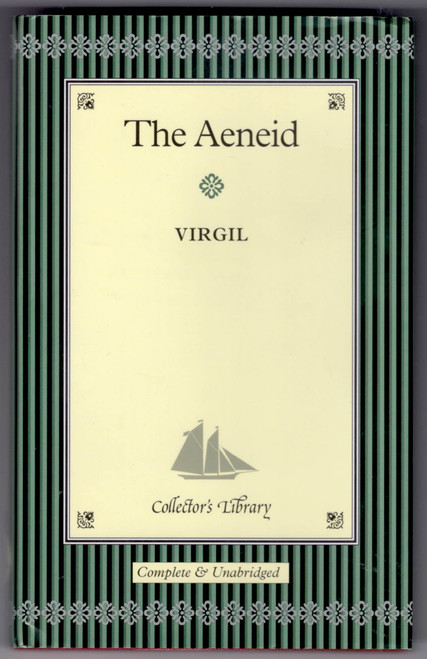Considered the greatest Roman poet, Vergil spent over a decade working on this monumental epic poem, which has been a source of literary inspiration and poetic grandeur for more than 2,000 years. Its twelve books tell the heroic story of Aeneas, a Trojan who escaped the burning ruins of Troy to found a new city in the west. This city, Lavinium, was the parent city of Rome.
Drawn by divine destiny after the fall of Troy, Aeneas sailed westward toward the land of the Tiber. After many adventures, he and his men were shipwrecked on the shores of Carthage, where Aeneas and Queen Dido fell in love. Reminded of his duty, however, Aeneas sailed on. After visiting his father in the underworld, Aeneas saw the future of the Roman people and their exploits in peace and war. Eventually he arrived in Italy, where he and his men struggled valiantly to secure a foothold for the founding of Rome.
Vast in scope, crowded with exciting adventure and heroic deeds, the Aeneid was Vergil's imagined account of Roman beginnings and a tribute to the history, character and achievements of the Roman people. On the other hand, its depth, vision and empathy with human suffering make the poem relevant to the general human condition. Now this enduring multileveled masterpiece is available in this republication of a standard unabridged translation, the most inexpensive complete version available.
Unabridged Dover (1995) republication of The Aeneid of Virgil, an English verse translation by Charles J. Billson, published by Edward Arnold, London, 1906.
About the Author
Publius Vergilius Maro (October 15, 70 BCE – September 21, 19 BCE), usually called Virgil or Vergil in English, was an ancient Roman poet of the Augustan period. He is known for three major works of Latin literature, the Eclogues (or Bucolics), the Georgics, and the epic Aeneid. A number of minor poems, collected in the Appendix Vergiliana, are sometimes attributed to him.
Virgil is traditionally ranked as one of Rome's greatest poets. His Aeneid has been considered the national epic of ancient Rome from the time of its composition to the present day. Modeled after Homer's Iliad and Odyssey, the Aeneid follows the Trojan refugee Aeneas as he struggles to fulfill his destiny and arrive on the shores of Italy—in Roman mythology the founding act of Rome. Virgil's work has had wide and deep influence on Western literature, most notably the Divine Comedy of Dante, in which Virgil appears as Dante's guide through hell and purgatory.




